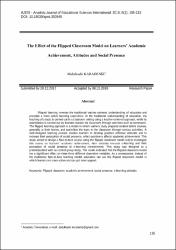The effect of the flipped classroom model on learners’ academic achievement, attitudes and social presence

Göster/
Erişim
info:eu-repo/semantics/openAccessTarih
2018Yazar
Anadolu Üniversitesi
Karadeniz, Abdulkadir
Üst veri
Tüm öğe kaydını gösterKünye
Karadeniz, A. (2018). The effect of the flipped classroom model on learners’ academic achievement, attitudes and social presence. Anadolu Journal of Educational Sciences International (AJESI), 8 (1), 195-213.Özet
Flipped learning reverses the traditional teacher-centered understanding of education and
provides a more active learning experience. In the traditional understanding of education, the
teaching of a topic is carried out in a classroom setting using a teacher-centered approach, while its
assimilation is carried out by learners outside the classroom through activities such as homework.
The flipped learning approach is a model in which learners study prepared content before courses,
generally at their homes, and assimilate the topic in the classroom through various activities. A
well-designed learning process enables learners to develop positive affective attitudes and to
increase their perception of social presence, which positively affects academic achievement. This
study aimed to design a face-to-face course using the flipped classroom model and to investigate
this course on learners’ academic achievement, their attitudes towards e-learning and their
perception of social presence in e-learning environments. This study was designed as a
pretest/posttest with no control group study. The results indicated that the flipped classroom model
has a significant effect on these three different dependent variables. As a consequence, instead of
the traditional face-to-face learning model, educators can use the flipped classroom model in
which learners are more active and can get more support.

















